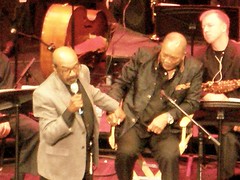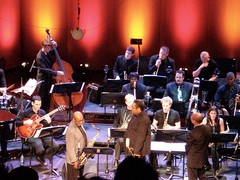Jazz, Public Diplomacy, and Dizzy Gillespie
U.S. Secretary of State Condoleezza Rice's videorecorded remarks set the tone for an evening commemorating the 50th anniversary of a critical event in U.S. public diplomacy history: Dizzy Gillespie's 1956 State Department-funded world musical tour. The tour was considered a turning point in U.S. cultural outreach to the world.
Press "play" to watch Secretary Rice's opening remarks (3min 43sec).
{exp:flvplugin playerpath="http://uscpublicdiplomacy.com/audio/" href="https://uscpublicdiplomacy.org/%3Ca%20href%3D"http://centeronpublicdiplomacy.com/podcasts/061012rice1.flv">http://centeronpublicdiplomacy.com/podcasts/061012rice1.flv" width="320"
height="260" autostart="false"}
To read the event transcript, click here.
The event, involving several schools at USC including the Center on Public Diplomacy, began with a one hour concert of be-bop classics that were performed regularly by Dizzy Gillespie's touring band. Joining the USC Thornton Jazz Band, conducted by Shelly Berg, were Jon Faddis on trumpet, and James Moody on saxophone -- both of whom were once integral members of Gillespie's band.
Following the performance, Annenberg Dean Geoffrey Cowan moderated an on-stage discussion which featured the legendary Quincy Jones, who was both the trumpet player and music director for the Dizzy Gillespie band on the 1956 State Department-sponsored tour.
On stage aside Jones sat a panel of scholars and musicians including:
Lalo Schifrin -- Argentinian piano player who joined the Gillespie band when they visited Buenos Aires in 1956 and never looked back;
Dave Usher -- Acting Public Information Officer on the '56 tour who recorded the South American leg of the '56 tour;
Adam Clayton Powell III -- Director of the Integrated Media Systems Center at USC. Powell's father, a Congressman, was instrumental in arranging and executing the '56 tour;
Nicholas J. Cull -- Historian, professor, and Director of USC's Master of Public Diplomacy program.
Event Report
By Andy Sternberg
"The music of Dizzy Gillespie spoke the language of freedom: the freedom to think; to innovate; and to speak in one's own voice," said U.S. Secretary of State Condoleezza Rice in video-recorded remarks to open the 50th anniversary commemoration of Dizzy Gillespie's State Department-sponsored world tour at the University of Southern California's Bovard Hall.
Special guests stars joined USC's Thornton Jazz Band for a performance of Dizzy Gillespie classics as they were heard on the 1956 tour. On trumpet was Jon Faddis, who performed with Dizzy Gillespie since he was a teenager. His sound at USC was still powerful, lyrical, unpredictable and bright. Gillespie himself once said of his protege: "he's the best ever, including me!"
Saxophonist James Moody performed in Dizzy Gillespie's bands on and off since the 1940's. His role in the 1956 world tour was indirect but significant, as Quincy Jones noted later in the night, when Jones called Moody up to thank him onstage.

Thanks, Brother
"I've wanted to say this for 50 years. If it wasn't for this man -- I wouldn't be up here today," Jones in thanking James Moody with an emotional embrace. "That man is the bomb!" Jones said of Moody, who recommended the young arranger and musician to be the 1956 band's music director (which entailed, among other things, arranging and rehearsing a the national anthems of dozens of countries).
The dialogue quickly shifted from prose and praise to jazz as the USC Thornton Jazz Band struck up the opening bass line of "A Night in Tunisia." The capacity audience at Bovard Hall was treated to an hour-long sampling of the music performed on the 1956 world tour, including compositions by Quincy Jones and Benny Golson, all featuring virtuosic solos from Moody and the visually inspired Faddis, evoking Dizzy in both sound and physical appearance, save for the signature bent-skyward trumpet used by Gillespie in the 50s and 60s.

John Birks "Dizzy" Gillespie was already internationally famous 1956, primarily due to his exposure on Voice of America. In 1955, VOA launched its "Jazz Hour," hosted by Willis Conover, which quickly grew into the stations most popular program, enjoyed by tens of millions of listeners in eighty countries, six nights a week.
As Quincy Jones explained, it didn't take long for the band to realize the impact of their music.
During the first leg of the 1956 tour, the U.S. State Department received word that Cypriot students stoned the U.S. Embassy in Athens. The State Department's musical band-aid was not far away -- performing in Ankara, Turkey -- when the call came. "'Send the Gillespie band,'" mimicked Jones.
In Athens, students stormed the stage. The band members weren't sure what to think, recalled Jones, until they put Gillespie on their shoulders and chanted "Dizzy, Dizzy, Dizzy."
Dave Usher, who was combination tour manager, public information officer and recording engineer on the tour, remembered an incident that occurred upon the band's arrival in Buenos Aires on the South American leg of the tour. After driving overnight from Guayaquil, Ecuador, on the Pacific Coast, through the Andes Mountains to Argentina only to be denied entrance at their hotel.
Dizzy Gillespie and his all star band -- sponsored by the U.S. State Department -- were turned away from a South American hotel that was owned by Americans. The story made headlines across Latin America, said Usher, "but it never made it back to the States."
The ensuing Q&A prompted Quincy Jones to put the evolution of music and its importance as a communicator into historical perspective. "In a hundred years," he said, "you'll be hearing Ellington, Dizzy, and Charlie Parker's name in the same breath as Bach, Beethoven and Mozart."
Jazz is "global gumbo," said Jones. "It eats everything in its path" and music that can transcend that must in some way incorporate it. Hip-hop may be an evolution of jazz, said Jones, adding that he recently advised young artists including Pharrell (Williams of The Neptunes) and will.i.am (of Black Eyed Peas) to mix more jazz and blues into their music. "It's all Esperanto."
Hip Hop may be controversial, said Nicholas Cull, professor of public diplomacy at USC's Annenberg School for Communication, "but to celebrate dissent the State Department should sponsor it and send it abroad."
In fact, Dizzy Gillespie's be-bop style -- looser, faster, more improvisational and full of surprises -- was long considered controversial as it grew out of the late 1930s heyday of big band swing. The brash style was considered offensive by many and was left to the fringes and after-hours jam-sessions. Slowly but surely, be-bop became the standard in its own right.
Before an encore performance of "Things to Come," the 73-year-old Quincy Jones provided some words of hope and wisdom to those both young and old at Bovard Auditorium.
"If you turn to creativity -- you can create your life. Cause and manifestation." And the multidimensional Jones, who offered to compose the theme for the 2008 Olympics while in Beijing last May after delivering a speech highlighting the value of cultural diplomacy: "If you know where you're coming from, it's easier to get where you're going."
News Coverage of the Event
Karen Grigsby Bates, "Dizzy Gillespie's Cold War Jazz Diplomacy", October 16, 2006, NPR "Day to Day."
Adolfo Guzman Lopez, "USC Commemorates 50th Anniversary of Historic Jazz Tour" (audio), October 16, 2006, KPCC.
Visit CPD's Online Library
Explore CPD's vast online database featuring the latest books, articles, speeches and information on international organizations dedicated to public diplomacy.








 Blogs commenting on this event
Blogs commenting on this event